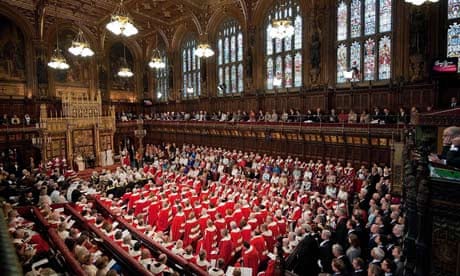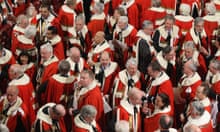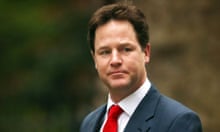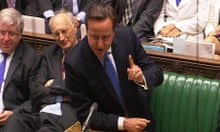David Cameron is poised to announce the abandonment of House of Lords reforms and fill the resulting void in the government's legislative programme with measures to encourage economic growth and job creation.
Conservative sources were briefing over the past 24 hours that plans for Lords reform had been dropped after the prime minister concluded there was no way of getting an elected second chamber past his backbenchers in a form acceptable to his Liberal Democrat colleagues.
The decision would be a huge political blow to the Lib Dem leader, Nick Clegg, who has now seen plans for Lords reform and electoral reform for the Commons thrown out owing partly to Conservative opposition.
It is almost certain that his party will respond by demanding that legislation designed to cut the number of MPs to 600 is also abandoned. The Lib Dems looked set to lose as many as 15 seats from a reform promoted by Cameron as a way of cutting the cost of politics and equalising the electoral size of constituencies.
Lords reform and boundary reviews were not explicitly linked in the coalition programme, but some Conservative cabinet members recognise that Clegg will have to exact public revenge over the rebuff if he is to keep his party committed to the coalition.
The Cameron decision, due to be formally announced this month, is likely to contribute to a turbulent mood at this autumn's Lib Dem conference, where the business secretary, Vince Cable, is set to ask for a change in emphasis in economic policy – the glue that has held the coalition together.
Lib Dem sources were clinging on to the hope that the briefings coming from the Cameron circle might prove premature. One senior source said he understood discussions were still ongoing.
Later another Lib Dem source suggested that once internal discussions are complete, Clegg, rather than Cameron, will make an announcement early next week. It was being stressed that the Lib Dems had stuck to their guns and it was the first time that the Tories had failed to deliver on a commitment in the coalition agreement.
Party sources said discussions were underway on how to fill the void in the legislative programme, as well as how to unwind the plans to redraw constituency boundaries.
Conservative sources told the Guardian that the focus had shifted to legislation that could fill the slot set aside for an elected second chamber. A huge amount of parliamentary time – as much as 14 days on the floor of the Commons – has been allocated for the legislation in both houses of parliament.
One source said the replacement would be "jobs, jobs, jobs", adding there had been a series of meetings on the issue in Downing Street on Thursday. Many Tory MPs had criticised the Lords legislation on the basis that the public saw democratic reform as an irrelevance at a time of national austerity and unemployment.
Lib Dems are likely to blame Labour for part of the failure, pointing out that Ed Miliband would not commit his party to a programme motion for the committee stages of the bill – a means of limiting the amount of time the bill would have spent being discussed on the floor of the Commons.
Miliband voted for a second reading, but would not have been able to take his parliamentary party with him if he committed to a programme motion. Some Labour MPs would oppose the programme motion out of principle, but others said it would represent too much co-operation with the government.
Ministers had looked at various slimmed-down versions of the reforms, such as replacing only the remaining hereditary peers with an elected element, but this proved unworkable, and likely to lead to a new set of objections from Tory MPs about a constitutionally unstable relationship between the two houses.
Conservatives focused their opposition to an elected second chamber on the fear that it could gradually undermine the primacy of the Commons, so creating instability. They were also likely to join forces with Labour to demand a referendum on the reforms, something both Cameron and Clegg opposed.
Abandonment of the reforms would lead to severe recriminations about why parliament was unable to agree to changes that all three major parties claimed to support.
Responding to the reports the shadow justice secretary, Sadiq Khan, refused to take responsibilty for the impasse, saying: "We warned Nick Clegg that the real roadblock to reforming the Lords was the Tory party – something we learned the hard way from our 13 years in government. Given today's reports, it's a pity that Nick Clegg simply dismissed our warnings and instead chose to lecture Labour. Only now is it dawning on Nick Clegg that it is his coalition partner that is tooth-and-nail opposed to reforming and modernising our second chamber.
"Nick Clegg marched his MPs through the voting lobbies in support of the harsh and unfair policies of this Tory-led government in anticipation of receiving Lords reform in return. But now Nick Clegg may end up with nothing, ruthlessly exposing his naivety. Millions of people struggling through the tough economic times will question his political priorities.
"Labour has always been committed to reform of the Lords. Our track record over 13 years is simply unmatched. Our manifesto argued for 100% elected with the proposals put to the people in a referendum. That's why we did the principled thing of voting in favour at second reading, despite the view that in the current economic climate reform of the Lords wouldn't be our priority."







Comments (…)
Sign in or create your Guardian account to join the discussion